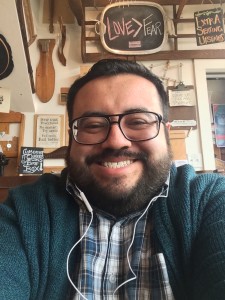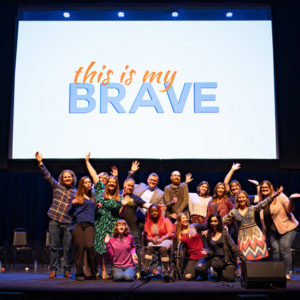I Have a Mental Illness and It’s Okay to Talk About It
A guest post by David Wise
Who am I? That is a question that most people ask themselves at many different points in their lives. Sometimes it’s easier for me to answer this question by stating who I am not. I am not: bipolar, crazy, static, totally depraved, damaged goods, or fundamentally flawed. This is who I am: David, a son, a partner, soon-to-be-father, spiritual, hopeful, faithful, in recovery and living with a treatable mental illness.
I have a mental illness, and it’s ok to talk about it.
My story or journey with mental illness begins at birth somewhere in Guatemala. I was born to a mother in Guatemala City, Guatemala, who suffered from psychiatric problems or mental illness. Little about her or her suffering and illnesses are known, but what we do know is, I have two older biological sisters, both adopted by a couple from the United States. We also know I was born in July of 1982 and adopted by a couple from Wisconsin that month as well. I grew up in a rural farm town in Wisconsin, had a great childhood, and laughed and played a lot. Like most adults who now suffer with a mental illness, I don’t remember having periods of major depressive episodes or mania during childhood, but I do remember playing outside in the woods, building forts, waterskiing, and collecting basketball cards. It wasn’t until much later, in 2004, my senior year of college, that I first began to experience symptoms of depression, anger, racing thoughts, and mood swings.
I remember the first time as an adult that I felt suicidal, it was in January of 2004, and I was on a college trip to Guatemala. Our college group was visiting Tikal, a Mayan Ruin, and I felt strong urges for suicide, but I didn’t understand why, and I didn’t tell anyone about it. Later that year, I would lose a fiancé and relationship, and begin my descent into depression. I attempted suicide for the first time that year. I was hospitalized in a psych ward for the first time ever in my life that same week, and was also referred to my first mental health professional, a psychologist who started working with me using Dialectical Behavioral Therapy (DBT). I also started seeing a psychiatrist. I was 22 years old.
Back in the present, it’s July of 2015, and I just turned 33 years old. I’m diagnosed with bipolar disorder I, and I’m managing it by treating it with therapy and medications under the direction of a Licensed Professional Counselor (LPC) and psychiatrist (MD). I’m engaged to be married. I’m about to go back on Social Security Disability benefits after being off them for months due to working my first full-time job in two years! I found out this past weekend I will be a father for the first time. I’m hopeful, scared, intentional, doubtful, and all the in-betweens. I am trying to be effective in making judgments, in my communication with others, in my reactions to people and situations. I am trying to make wise life decisions.
What is mental health stigma? To me stigma is this the myth that it’s not ok to talk about mental illness, or mental health recovery, for that matter. It’s not socially acceptable to say you’re feeling depressed, you’ve had or are having thoughts of self-harm or suicide, or that you take prescription psych meds under the direction of a licensed physician. It’s taboo to see a therapist or counselor. Stigma means these words to me: alienation, isolation, and hopelessness. Stigma makes me feel there is no way out. Even if I know help is out there, or believe hope is real, help and hope are not tangible or easily available because of stigma. Stigma means silencing voices, not telling stories, or saying people don’t matter; they’re not important. Stigma is fear based. Fear of the unknown-but also fear based on not wanting to know or be known.
How does stigma affect people suffering from mental illness? Stigma affects me by limiting my options of resources. It makes me second guess my decision to ask for help. For example, if I know a 24-hour crisis line exists, and maybe even have their phone number saved in my phone, but don’t feel like I can call it or reach out to a friend for help, then I am reacting out of fear because of stigma. Then that help is no longer real nor easily available. I suffer alone. It’s difficult and sucks suffering alone. People need help from others from time to time, or a lot of the time for that matter. That’s ok. Stigma says that it is not ok to need other people or ask for help, because stigma says we cannot talk about mental illness.
If we cannot talk about it, how can we identify our need for help or ask for help, even if help is available?
Could lives be saved or transformed by destroying stigma? I believe the answer is yes! Destroying stigma begins with me, with you, and by being honest about our struggles, our hopes, our fears, and our dreams for something more. Honestly, I’m David, from St. Louis, Missouri, and I’m living with bipolar disorder. It does not define me. I can learn about it, treat it, manage it, and sometimes I do that more effectively than other times. Stress, both good and bad, affect me differently than others, even others with bipolar disorder. I do take psych meds under the direction of my psychiatrist. I do go to therapy regularly, even today. I struggle, but I fight for life, and hope, and I continue to dream big! I suffer, sometimes alone, but I continue to struggle and walk on, side by side with friends, mental health professionals, family, loved ones, and even pets like pug dogs. I’m creative, and inspired, and perhaps inspiring to some. I’m musical. I’m a reader. I am a learner. I’m a giver. I’m gracious, patient, kind, and generous. But above all I’m learning my own limitations, my own weaknesses and my own strengths, and how to tell my story so others can feel less alone. I tell my story so others can feel hope too, and so stigma one day in my lifetime, can be destroyed.
That’s why I am blogging today. I write to help tell a story of a life created, a life that is beautiful, messy, hurting, hopeful, and full of words, and pages, and chapters, with many left, yet to be written by me and the lives of all those with whom I intersect. Honesty, grace, and compassion define me. Friendship, medicine, and therapy are what I need. Hope that is greater than fear, and a voice that is greater than silence is what I am longing. I dream big dreams, dreams so big, one heart or mind cannot contain them. These are the people and things that are required to tell my story and your story, and to start to destroy the stigma surrounding mental illness.
I have a mental illness, and I want to talk about it.
-David
#mystorymatters #yourstorymatters #davidisimportant #letsdestroystigmatogether #behonest #itsoktotalkaboutit #itsoktoaskforhelp
*****
 About the Author
About the Author
David Wise is 33, creative, extroverted, and enjoys friendship. He is a native of Wisconsin by way of adoption from Guatemala. Currently David resides with his fiancé in St. Louis, Missouri. For fun he likes playing guitar, enjoys reading, bicycling and going to coffee shops. David blogs regularly about his mental illness, bipolar disorder, mental health recovery and finding and losing faith at: davewisematters.com
*****
Are you interested in writing for our blog? If so, please check out our Submissions page.

